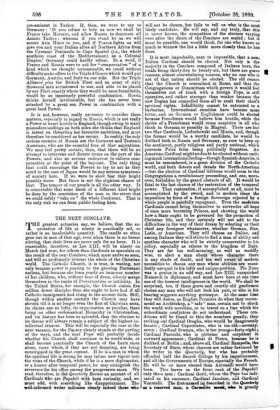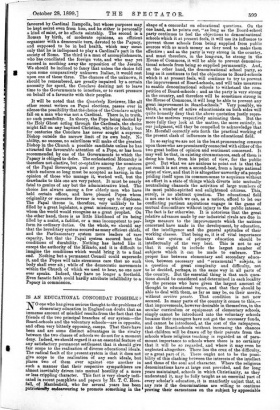THE NEXT CONCLAVE. T HE greatest actuaries say, we believe, that
the ex- pectation of life at ninety is practically nil, or rather is an incalculable quantity. The candle so often goes out in men of that age, even when there is no breeze stirring, that their lives are never safe for an hour. It is reasonable, therefore, as Leo XIII. will be ninety on March 2nd next, for others than Cardinals to speculate on the result of the next, Conclave, which must arrive so soon, and will so profoundly interest the whole of the Christian world. The Catholic Church, it is true, is waning, not only because power is passing to the growing Protestant nations, but because she loses yearly an immense number of her children, who, without beat of drum, silently merge themselves in the ranks of Protestantism or infidelity. In the United States, for example, the Church claims five million fewer disciples than she ought to have had if all Catholic immigrants had clung to the ancient faith. Still, though within another century the Church may have shrunk till it is no longer even the first of Christian sects, its claims are so lofty, its organisation so peculiar, there being no other ecclesiastical Monarchy in Christendom, and its history has been so splendid, that the election to its throne will always remain a subject of the highest in- tellectual interest. This will be especially the case at the next vacancy, for the Papacy clearly stands at the parting of the ways, and the next Pope will probably decide whether his Church shall continue to be world-wide, or shall become practically the Church of the Latin races alone, races which, if they are not decaying, are being outstripped in the great contest. If he is a man in whom the spiritual life is strong he may infuse new vigour into the veins of the Church, while if he is a mere diplomatist, or a hunter after temporal power, be may extinguish the reverence for his office among the progressive races. We read, therefore, in the Quarterly Review an account of all Cardinals who are Papabili with keen curiosity, and, we must add, with something like disappointment. The well-informed writer indicates clearly indeed those who will not be chosen, but fails to tell us who is the most likely candidate. He will say, and say truly, that this is never known, the sympathies of the electors varying even after the doors of the Conclave are sealed ; but it must be possible, one would think, for one who knows so much to winnow the list a little more closely than he has done.
It is most improbable, next to impossible, that a non. Italian Cardinal should be elected. Not only is the majority in the Conclave composed of Italians born, the totals being thirty-five to twenty-six, but there are grave reasons, almost overwhelming reasons, why no one who is not of that nation should be elected. The old reason that the Church is centralised in Rome, and that the Congregations or Committees which govern it would feel themselves out of touch with a foreign Pope, is still operative, and rather stronger than weaker because the new Dogma has compelled them all to exalt their chief's spiritual rights. Infallibility cannot be entrusted to a barbarian. International enmities have become more bitter, and no German or Englishman could be elected because Frenchmen would believe him hostile, while the choice of a Frenchman would rouse suspicion in all who think in German or possibly in Magyar. There are but two Slav Cardinals, Ledochowski and Missia, and, though the former would be a worthy candidate, he would be disliked both in Russia and Germany, as sure to keep up the sentiment, partly religious and partly national, which prevents Poles from being politically forgotten. An American Cardinal might no doubt be elected without excit- ing much international feeling—though Spanish-America, it must be remembered, is a great division of the Catholic world, and both detests and dreads the North-American —but the election of Cardinal Gibbons would seem to the Congregations a revolutionary proceeding, and one, more- over, forbidden by the grand obstacle of all. It would be fatal to the last chance of the restoration of the temporal power. That restoration, if accomplished at all, must be accomplished by the sword, and to modern ideas the imposition by force of a foreign Sovereign rejected by a whole people is painfully repugnant. Even the moderate Cardinals cannot bring themselves to surrender all hope of once more becoming Princes, and showing the world how a State ought to be governed for the promotion of Christian life, and they certainly will not add to the difficulties in the way of their dream by selecting as their chief any foreigner whatsoever, whether German, Slav, Latin, or American. They will choose an Italian, and among Italians they will strive to find a man of ability and spotless character who will be strictly conservative in his policy, especially as relates to the kingdom of Italy. They are far too well-meaning, as well as worldly wise, to elect a man about whose character there is any shade of doubt, and too well aware of modern necessities to choose any man whose abilities are mani- festly unequal to his lofty and unique position. Pio Nono was a genius in an odd way, and Leo XIII. vanquished Bismarck in diplomacy, and must have been at one time one of the keenest intelligences in the world. We shall be surprised, too, if those grave and courtly old gentlemen choose any man who will not look his part, or who in his bearing suggests anything grotesque. At the same time they will desire, as English Premiers do when they recom- mend an Archbishop, a " safe " man, certain not to shock the world with novelties, or to travel on a line which his subordinate coadjutors do not understand. These con- ditions will be found to thin the numbers greatly, they striking out Cardinal Oreglia, who would be dangerously fanatic ; Cardinal Capecelatro, who is too old—seventy- seven ; Cardinal Svampa, who is too young—forty-eight ; Cardinal Parocchi, who is plebeian and corpulent in outward appearance ; Cardinal di Pietro, because he is disliked at Berlin ; and, above all, Cardinal Rampolla, the Secretary of State, whose chances are rather favoured by the writer in the Quarterly, but who has probably offended half the Sacred College by his imperiousness, and all the Governments of Europe, especially the French. He will be no more elected than Antonelli would have been. This leaves in the front rank of the Papabili only three men : Cardinal Gotti, whom the Pope has indi- cated as his successor, Cardinal Jacobini, and Cardinal Vanutelli. The first-named is described in the Quarterly as a reserved man, a Carmelite mask, who is greatly favoured by Cardinal Rampolla, but whose purposes may be kept secret even from him, and he either is personally a kind of saint, or he affects saintship. The second is a Roman by birth, of moderate opinions, an efficient organiser with a democratic turn, devoted to the Papacy, and supposed to be in bad health, which may mean only that he is indisposed to play a Cardinal's part in the society of Rome. The third is a man of accomplishments, who has conciliated the foreign vote, and who may yet succeed in soothing away the opposition of the Jesuits. We should be inclined to fancy that unless the choice fell upon some comparatively unknown Italian, it would rest upon one of these three. The chances of the unknown, it should be remembered, are greatly impaired by a certain necessity for speed, the Conclave desiring not to leave time to the Governments to interfere, or to exert pressure on behalf of a favourite with their peoples.
It will be noted that the Quarterly Reviewer, like all other recent writers on Papal elections, passes over in silence the possibility that the choice of the Conclave might fall on a man who was not a Cardinal. There is, in truth, no such possibility. In theory, the Pope being elected by the Holy Ghost acting through the Cardinals, the choice might fall on any baptised Christian, white or black ; but for centuries the Conclave has never sought a supreme Bishop outside the narrow limit of its own body. No ability, no success, no saintliness will make of the greatest Bishop in the Church a possible candidate unless he has attracted the favourable attention of a Pope, or has been recommended by one of the Governments to which the Papacy is obliged to defer. The ecclesiastical Monarchy is therefore not elective, but co-optative among the nominees of the Papal Sovereigns, past or present. Any system which endures so long must be accepted as having, in the opinion of those who manage it, worked well, but the drawbacks to this one are very patent. It must be nearly fatal to genius of any but the administrative kind. The choice lies always among a few elderly men who have held certain offices, and have pleased Popes whom originality or excessive fervour is very apt to displease. The Papal throne is, therefore, very unlikely to be filled by a great legislator, a great missionary, or any one whom the world would recognise as a great prophet. On the other hand, there is as little likelihood of its being filled by a zealot, a faddist, or a man incompetent to per- form its ordinary duties. On the whole, we should say that the hereditary system secured-as many efficient chiefs, and the Parliamentary system more leaders of rare capacity, but that the Papal system secured best the conditions of durability. Nothing has lasted like it except the authority of the Mikado, and it is difficult to imagine the conditions which would bring it to a final end. Nothing but a permanent Council could supersede it, and the Popes will take strenuous care that no such body shall ever sit ; while of the democratic movements within the Church of which we used to hear, no one now ever speaks. Indeed, they have no longer a foothold. Even fanatic faith could hardly attribute infallibility to a Papacy in commission.







































 Previous page
Previous page